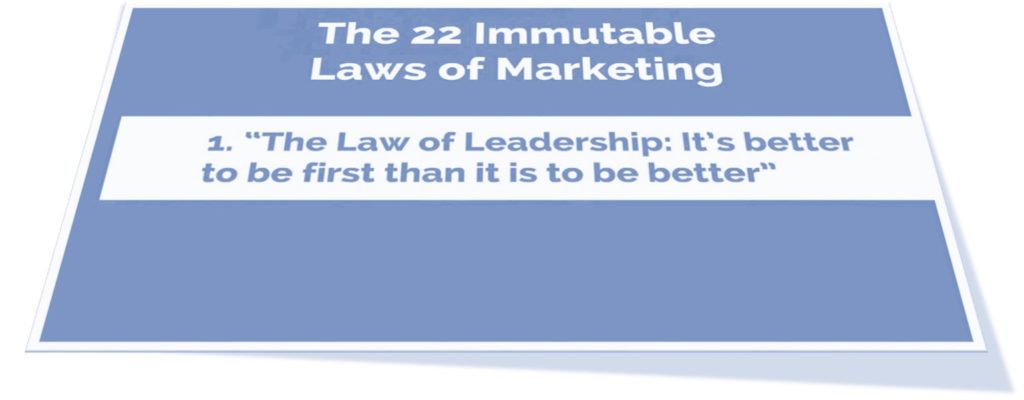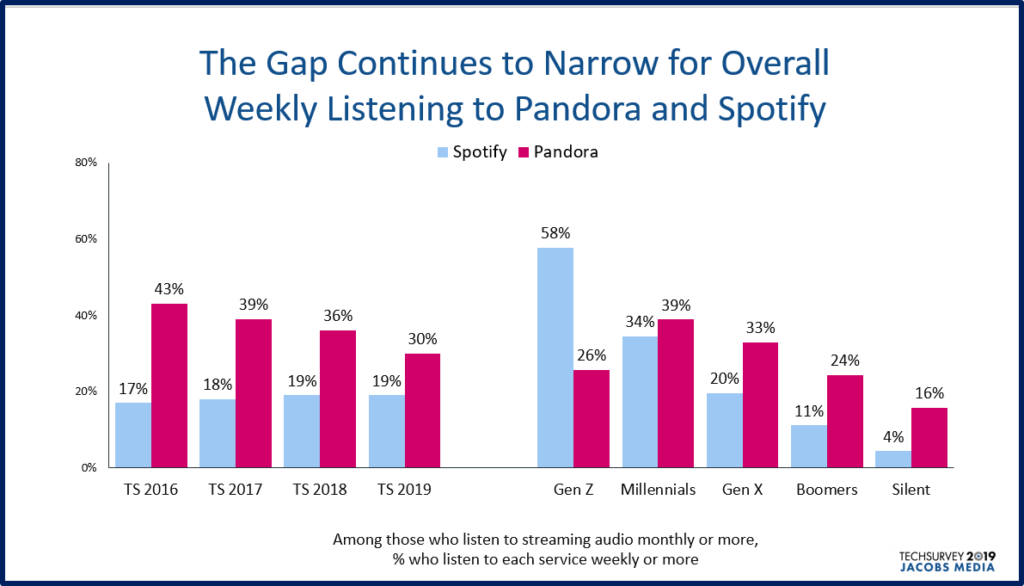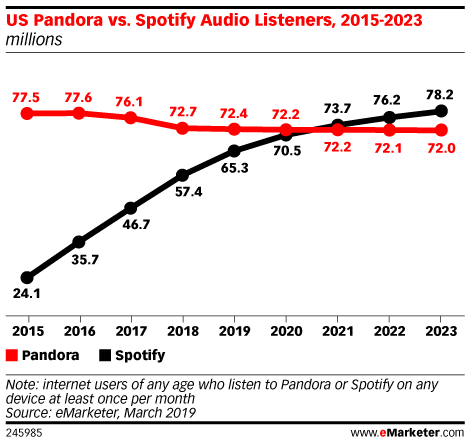
If you were a student of radio back in the 80s, the names Al Ries and Jack Trout were synonymous with the gurus of marketing today – Seth Godin, Gary Vee, and the others who are all over the Internet with their wisdom and insights.
Ries & Trout became an oft-quoted duo, known first for their “Positioning: The Battle For Your Mind” book which first appeared in 1980. It resonated perfectly with the Arbitron diary methodology that was the industry standard in those days. Ratings were won and lost on perception and recall, and Ries and Trout provided the schematic to achieve both.
Later in 1993, they wrote “The 22 Immutable Laws of Marketing.” While some of these rules seemingly clashed with others, most radio strategists freely cite these Ries & Trout tenets in much the same way people quote Constitutional amendments.
Not surprisingly, their #1 premise is “The Law of Leadership.” 
And they laid out three attributes to describe this all-important marketing law:
- It’s better to be first than it is to be better.
- The basic issue in marketing is not convincing prospects that you have a better product or service. The basic issue in marketing is creating a category you can be first in.
- It’s much easier to get into the mind first than to try to convince someone you have a better product than the one who got there first.
And back in the day, this “law” held up well, supported by the success of companies like Coca-Cola, Xerox, and Hertz, as well as radio companies that included Clear Channel, Viacom, New Cities, and Cox. A well-positioned, first-in company – or radio station – could occupy the top spot for decades.
Enter the Internet, and the marketing cycle accelerated in ways that were unimaginable just a few years earlier. And with that speed came disruption. In sector after sector, the early leader in a new space often found themselves supplanted by a better competitor that came around years later. First-in Napster gave way to Apple’s iTunes, Blackberry caved to iPhone, Yahoo! became a shadow of Google, and MySpace was destroyed by Facebook.
And every brand seemingly in the leadership driver’s seat today is running scared because the same fate will happen to them. This is part of what drives Tim Cook, Mark Zuckerberg, Jeff Bezos, and the other new captains of technology.
And that includes Pandora.
While once the king of audio streaming with its clever Human Genome algorithm, Pandora has fallen on hard times in the past few years, finally being sold off to SiriusXM in 2018. Throughout our new Techsurvey, we see multiple signs Pandora is experiencing speed bumps. In fact, among the youngest generations, its leadership role is in jeopardy due in large part to the presence of Spotify:

Among Gen Z’s it’s no contest. And the gap among Millennials is narrowing.
Some research outfits are predicting Pandora will lose its #1 status in the music streaming space before too much more time passes. A recent study from eMarketer suggests Spotify will leapfrog into the lead as early as 2021 – one year sooner than they prognosticated last year. As you can see on the chart (below right), the black line (Spotify) is getting dangerously close to the red one (Pandora). 
While Techsurvey doesn’t show a great deal of Spotify growth (our sample is not hefty among teens), it does point to continued erosion for Pandora – much like the eMarketer survey shows.
It’s another sign that leadership in the tech space is transitory. There’s always room for “the next big thing” to come along and capture the public’s imagination. In the case of Spotify, its secret sauce was its ability to create and share customized playlists, rather than a curated approach like the Pandora algorithm. But there’s more to it than that.
Analyst Chris Bendtsen attributes Spotify’s “takeover” of Pandora to partnerships, as well as growth in the use of both smart speakers and mobile devices. He notes the company has hooked up with Amazon, Google, and Hulu to enable presence on both gadgets and content bundles.
Meantime, SiriusXM is scrambling to turn Pandora around. And unlike Spotify, they’re banking on new features to stimulate streamers (and advertisers) to come back. In fact, they’re pulling out the stops to try to stop the bleeding.
A new agreement with Instreamatic will test ads that allow Pandora listeners to talk back to ads, similar to the innovation XAPPMedia was pushing several years ago.
Pandora also unveiled a sonic logo – a topic recently covered in this blog. Muse by Clio editor in chief, Tim Nudd, reports this new audio signature is part of a larger “Sound On” campaign. The sound is designed to “mimic the feeling of opening Pandora and having instant access to the audio/soundtrack you want to hear,” according to Matt Winegar, the Grammy-winning producer who created Pandora’s new “jingle.”
The “Sound On” campaign is extensive, covering six U.S. markets to start, featuring a variety of well-known musical artists. There is also an outdoor campaign, along with mega-ads at iconic locations that include Time Square, as well as animated transit ads.

But perhaps the biggest change is in Pandora’s original algorithm, which provided for little-to-no personalization and customization for users. A new feature allows users to tweak the algorithm to control your own experience.
Pandora calls them “mode” and you can select as many as six of them to express and apply your tastes and moods. In a story last month in The Verge, Dani Deahl walks Pandora users through these “modes” that range from the original formula (“My Station”) to a full-on discovery option (“Newly Released”) to guide users through the freshest music from a selected genre.
Diehl reports Pandora is also using a feature called “Stories” to mesh podcasts with music so podcasters can try their hand at different storytelling formats.
Are these features enough to reverse Pandora’s momentum (or lack of it)? Like a radio station trying commercial-free programming, contests, or a new nighttime show, Pandora isn’t taking the competition lying down.
Its corporate team knows all too well the shaky quality of Ries & Trout’s “Law of Leadership.” They may have been first-in to their space, but that means very little now to today’s new consumers.
Broadcast radio should be thinking along those same lines. While ruling the audio roost throughout modern media history, radio now finds itself challenged by hungry, well-financed, and smart competitors.
Game on.
- What To Do If Your Radio Station Goes Through A Midlife Crisis - April 25, 2025
- A 2020 Lesson?It Could All Be Gone In A Flash - April 24, 2025
- How AI Can Give Radio Personalities More…PERSONALITY - April 23, 2025




On air persons seem to be totally fungible if not totally out as a factor.
Barring the celebrity but those are mostly podcast related.
So my comment is , am I correct ?
I would suggest MySpace didn’t need Facebook to get killed. Part of My Space’s attraction was the ability to make the page look any way you wanted. Most of the results weren’t pretty, but they reflected the page-owner’s personality. Then MySpace standardised the pages. Three days after the change I went to a music industry party full of musicians and managers who used the site. To a person – 100% – they were leaving it. Because they couldn’t personalise it anymore. To paraphrase a well-known British politician, don’t make changes when you don’t already know the outcome.
Or as we often say in perceptual studies when our station is doing well and the research reflects it: DFIU
Thanks, John.
Good thoughts Fred. I was recently analyzing this and SiriusXM is tremendously improving Pandora’s profitability prospects. Pandora/Sat radio in car moving to the screen via mobility (and you know the AI & video deals I’m talking about) traditional ‘radio’ will need to combat. Or, Game on, as stated. The Pandora v Spotify metrics and comparisons are also just not on par because they serve different consumers who use multiple platforms, international differences, margin, even the tech mentioned was once called ‘The Slider’ inside SXM app.. it was great for those who used it. Pre Sirius moving into homes era… and the deals required. All the best! Thank you
Good comments all, Josh. Good hearing from you & thanks for chiming in.